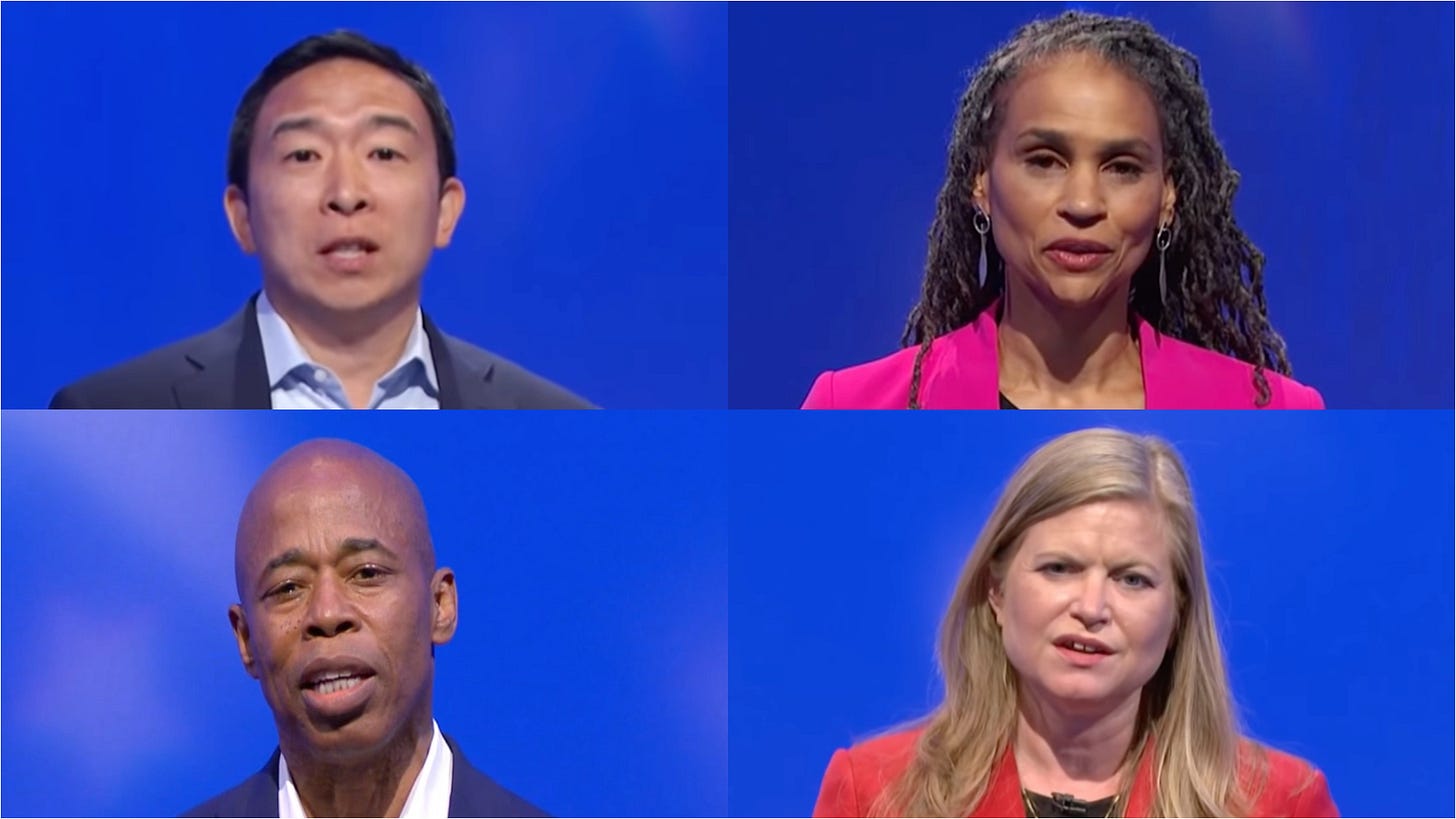The NYC Mayor's Race Is an Election Straight From Hell
Terrible candidates and a voting system that only increases the agony—make it stop!
On Tuesday, the New York City mayoral primary will finally come to an end. Thank god.
This is the first time the city has used ranked-choice voting to determine its next mayor. Ranked-choice voting is meant to make it easier and less fraught to conduct elections, by eliminating runoffs and allowing people to vote their conscience with their top choices before ranking their lesser favorites. But they forgot to tell us that ranked-choice voting makes everything especially awful if the choices you have to rank are awful—and the choice New York City voters have been left with is as lousy as it gets.
Because of that, ranked-choice voting has given the mayoral race an extra note of psychological and psephological anguish, as voters struggle both to figure out who their least hated candidate is and also to game out how to block their most hated candidate from winning. It has made everything frustrating and strange and, above all, deeply depressing.
You can see the oddities popping up all over the place, driven mostly by the fact that the field is wildly uninspiring. The ever-shifting nature of the race has given it a particularly chaotic feel, and has created a string of bizarre alliances.
For instance, Maya Wiley—the less-than-thrilling lawyer who became the race's progressive standard-bearer by default after Dianne Morales and Scott Stringer's campaigns imploded for bad boss and alleged sexual misconduct reasons, respectively—has been endorsed by both Alexandria Ocasio-Cortez and Hakeem Jeffries, who is the sworn enemy of AOC's wing of the Democratic Party. Jeffries' second pick is Eric Adams, the former Republican cop. Adams also picked up a #2 endorsement from Rep. Ritchie Torres, who is backing Andrew Yang as his first choice. Yang and Adams openly loathe each other, and Adams is now cynically accusing Yang of racist voter suppression because he's teamed up with centrist technocrat Kathryn Garcia in a ranked-choice partnership. This is a change from the phase of the campaign when Garcia was accusing Yang of sexism because he kept saying he wanted her to run his government, but that he should still be mayor. Wiley said that she was approached to join Yang and Garcia but refused after Yang's recent appalling comments about people with mental disabilities.
Nobody can agree on whether Yang or Adams would be worse in office. Do you want the guy backed by the slimiest parts of the Michael Bloomberg swamp who thinks people with mental illnesses are little more than a plague on society and wants to increase the NYPD's stranglehold on the city, or the assuredly corrupt career pol who also wants to increase the NYPD's stranglehold on the city and who can't even tell people where he lives with clarity? Adams has received glowing praise from Rudy Giuliani. Yang's comments on Israel were backed to the hilt by Stephen Miller. Figure that one out. Prominent observers have gone both ways on this question. (Personally, I'd lean towards Adams being worse, but ask me in 20 minutes, I might have changed my mind!)
Subscribe to Discourse Blog! Support independent journalism for as little as $8 a month.
Liberals have lunged towards Garcia as a way to block either Yang or Adams. Meanwhile, Garcia says that her mayoralty would look like a combination of the Bloomberg and Ed Koch administrations. Is that really the best we can do?
It is, as they say, a mess, the harm reduction theory of politics on steroids. (I won't even get started on the Manhattan District Attorney's race, which is on the verge of being bought by a right-wing millionaire Democrat.) Ranked-choice makes the process especially tortured. On the one hand, you should absolutely not rank a candidate if you don't want them to be mayor. But on the other hand, what if you don't rank a bad person and then an even worse person squeaks through because not enough people tried to block them? It's like a miniature version of the problem that plagued the Democratic presidential primary, where millions of people made their voting decisions based on who they thought other people would vote for.
For the left, the whole race has been something of a debacle. Worries about crime shifted the debate in ways that delighted hard-line candidates like Adams and Yang and fed into the worst impulses of the local media. (A real sample question at the most recent mayoral debate on NBC: how would you convince someone to join the NYPD?) But the real problems were baked in from the beginning: the field just wasn't good enough. One candidate after another was first elevated as the progressive choice and then discarded once the seeming hollowness of their persona was revealed (Morales) or their alleged personal history made them untenable (Stringer)—a sign of both the lack of real loyalty any of the candidates were inspiring and of the rising desperation on the left.
The decision to rally around Wiley by default has quite possibly come too late. No votes have been counted but we're already getting headlines like this from The Nation: "Socialists Were Once Serious Contenders for Mayor of New York, and They Will Be Again." The prospect of hoping that a good leftist will emerge in four or (more likely) eight years is very grim. New York has a massive housing and cost of living crisis, an out-of-control police force, stark segregation, and deep-seated challenges when it comes to things like transportation and climate change. Eight years is a long time to wait. For now, the best hope is that Wiley, the only top-tier liberal candidate left, can scrape through, and that the leftist presence on the City Council can increase. But it's easy to envision a scenario in which neither of those things happen.



